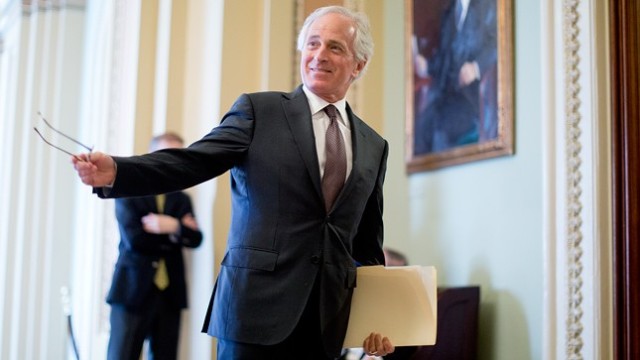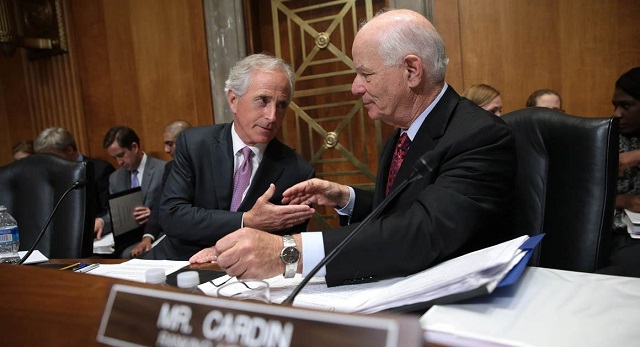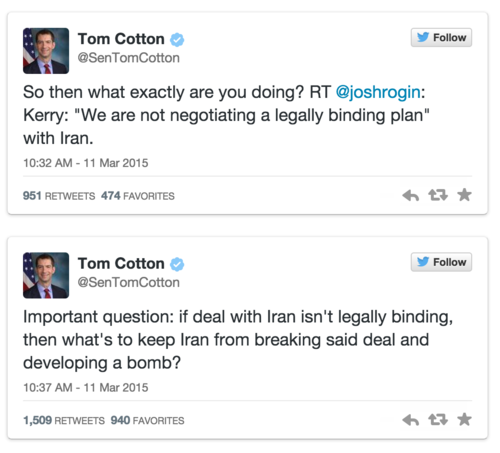Was the 98 to 1 U.S. Senate vote on the Iran Deal a “rebuke” of President Obama?
At a conclusion of an Iconoclast post on the Twitter battle between Iranian Foreign Minister and Senator Tom Cotton (R-AK), set against the backdrop of yesterday’s virtually unanimous vote for the Iran Nuclear Agreement Review Act of 2015 (INARA), we wrote:
While [Senator] Cotton’s proposed amendment might void the Israel amendment of Rubio, it will make more complicated Majority Leader senator Mitch McConnell’s management of the INARA legislation as he seeks to assure passage early in the week of May 4th. Stay tuned for developments.
The Hill, while trumpeting Thursday’s Senate vote of 98 to 1, noted what Majority Leader Senator Mitch McConnell (R-KY) was forced to do to assure passage of the compromised version brokered by Senate Foreign Relations Committee Chair, Senator Bob Corker (R-TN) and Ranking Member Ben Cardin (D-MD):
Republicans also expressed frustrations that they could not offer more amendments to the bill.
Senate GOP Leader Mitch McConnell (R-KY) filed a motion to end debate after Sens. Marco Rubio (R-FL) and Cotton tried to force a vote on an amendment requiring Iran to recognize Israel’s right to exist as part of a final deal.
The move was a reversal of the open amendment process Republican leadership pledged to bring to the Senate.
McConnell said Thursday that he would have preferred that amendments be added to the bill, but that it might have invited a presidential veto.
“If we didn’t face the threats of filibusters, or the blocking of amendments, or the specter of presidential vetoes, this bill would be a heck of a lot stronger. I assure you,: he said. “But the truth is, we do. That’s the frustrating reality.”
But note the actions of GOP 2016 Presidential Contenders, Senator Marco Rubio (R-FL) and Ted Cruz (R-TX):
Rubio slammed the decision not to allow his amendment requiring Iran to support Israel as part of a deal to come up for a vote, saying that some senators are “terrified” of voting against it.
“Apparently there are senators terrified of voting against that amendment, so they’d rather not have a vote at all. So I am deeply disappointed by the direction this has taken,” he said.
But, he added that he would support the final bill, suggesting that it was better than nothing.
“At a minimum at least it creates a process whereby the American people through their representatives can debate an issue of extraordinary importance,” he said. “So I hope this bill passes here today so at least we’ll have a chance to weigh in.”
Rubio’s remarks separate him from his presidential rival Sen. Ted Cruz (R-Texas) who said on Wednesday that the legislation is a “bad bill.”
But Cruz voted in favor of the bill after voting against ending debate on it.
“I voted no on cloture because we should have insisted on amendments to put real teeth in this bill,” the Texas Republican said. “Ultimately, I voted yes on final passage because it may delay, slightly, President Obama’s ability to lift the Iran sanctions and it ensures we will have a Congressional debate on the merits of the Iran deal.”
Cruz was joined in voting against ending debate by fellow GOP Sens. Charles Grassley (Iowa), Tom Cotton (Ark.), Jerry Moran (Kansas), Mike Lee (Utah) and Dan Sullivan (Alaska).
Sen. Barbara Boxer (D-Calif.) was absent for the vote.
In the end, Rubio and Cruz voted for the Corker-Cardin compromise. Given comments by House Speaker Boehner the measure will easily secure House approval enabling INARA to go to President for his signature. The measure will give the Senate a 30 day window for review of any agreement that surfaces from the current P5+1 negotiations and may require periodic review of Iran’s state sponsorship of terrorism and ICBM development. At best INARA will put a temporary hold on the President lifting sanctions including suggestions giving Iran ‘signing bonuses” estimated at $30 to 50 Billion. Release of these impounded funds might enable Iran to achieve nuclear threshold status and develop both a nuclear warhead and an ICBM to deliver it for hegemonic purposes. However, should the Senate disapprove the measure on less than an unanimous level, the President can veto it and proceed with his plan to have it ratified by a UN Security Council Resolution. This would achieve his questionable legacy of allegedly turning Iran from a rogue terror supporting global state terrorism to a ‘respected member of the world community’. As the hoary English proverb says: “ if wishes were horses beggars would ride”.
Would this near unanimous Senate vote have been rendered without Israeli PM Minister Netanyahu addressing a joint meeting of Congress about a “very bad deal” over the objections of President Obama and Democratic Senators? The lone exception to the chorus of Democratic nay-sayers was the original co-sponsor of a tougher version of INARA, New Jersey Senator Bob Menendez (D-NJ), who was forced to step down as Ranking Member of Senate Foreign Relations because of a Department of Justice indictment for alleged corruption charges. Or was action on INARA perhaps prompted by the outrage over Senator Cotton’s much maligned letter signed by 46 Republican colleagues tweeted to Iran’s Islamic Republic leaders about Senate Constitutional prerogatives on approval of treaties and major international agreements? His twitter war with Foreign Minister Zarif may have been a side show, but the message was clear about the lack of trust in any deal with Iran that isn’t verifiable and transparent. Senator Cotton’s procedural amendments did precipitate the call for cloture on floor amendments by Majority Leader McConnell. Cotton’s lone vote against the compromise version of INARA on his valued stand, that any P5+1 nuclear deal with Iran should be in the category of a treaty requiring a two thirds vote by the senior chamber of Congress may also sent an important message.
Could his protest vote been a prescient warning to his Senate colleagues about the dangers inherent in any P5+1 deal to America and Israel that emerges for review after June 30th? Again, stay tuned for developments.
RELATED ARTICLE: The Corker Bill, as passed, is worse than useless
EDITORS NOTE: This column originally appeared in the New English Review. The featured image is of U.S. Senator Bob Corker (R-TN) after the near unanimous vote on Iran Nuclear Review Act (INARA), May 7, 2015.




